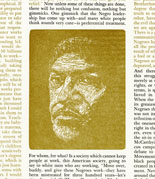Africana Studies Resources
Civil Rights

“Bayard Rustin,” portrait by Thomas Cornell. In: Bayard Rustin: Goals and Strategies Necessary in the Achievement of Civil Rights (Brunswick, Me.: Tragos Press, 1964).
![Ku Klux Klan, Waterville, Maine. Archie Smith to Governor Ralph O. Brewster, 1927 Dec 8 [Ralph Owen Brewster Papers] - Brewster’s response to this request for protection of Klansmen reads: “local auth[ority]—Sheriff, etc.”](/arch/subject-guides/africana-resources/images/small/m200s2b11f22-kkk-waterville-small.jpg)
Ku Klux Klan, Waterville, Maine. Archie Smith to Governor Ralph O. Brewster, 1927 Dec 8 [Ralph Owen Brewster Papers]
Please note when the library recently updated our online catalogs, the links in our subject guides broke. We are working actively to fix this problem. In the meantime, you can search for materials referenced by consulting the library catalog and our catalog of archives and manuscript materials.
Primary resources supporting research in the Civil Rights movement in America come mainly through the personal papers of politicians and journalists connected to Bowdoin, and through the papers of Bowdoin faculty and student organizations who have taken special interest in the positioning of African Americans in the social, civil, political, and intellectual spheres of American life.
- Abbott Memorial Collection includes the Lyman Abbott Autograph Collection. Lyman and Edward Abbott, editors of the Christian Union and the Literary World, were closely linked with figures prominent in 19th-century American literary, cultural, and political circles. They collected letters and other documents sent to them by writers, politicians, educators, and civil rights leaders, among others, including W.E.B. Du Bois and Booker T. Washington.
- Ralph Owen Brewster Papers. Brewster (Class of 1909) practiced law and then entered politics, serving in the Maine state legislature, winning the governorship, and eventually representing Maine in both houses of the U.S. Congress before losing his senate seat in 1952. His views on race, and those of his constituents, informed his political posturing, particularly concerning the “Negro Vote” and Mainers’ affiliations with the Ku Klux Klan.
- Harold Hitz Burton Papers. Burton (Class of 1909) became a lawyer and legislator in Ohio before joining the bench as an Associate Justice of the U.S. Supreme Court (1945-1958). He staked out a moderate position but took the lead in favoring the extension of civil rights to for African‐Americans, most notably in the landmark desegregation case of Brown v. Board of Education in 1954.
- Robert Hale Papers. Hale (Class of 1910) became an attorney and served in the Maine state legislature and the U.S. House of Representatives. He considered himself a reactionary, especially with respect to the New Deal, and was a strong defender of civil rights.
- George J. Mitchell Papers. Mitchell (Class of 1954) entered the field of law and was an assistant to Senator Edmund Muskie before serving in the U.S. Senate from 1980-1995; he was senate majority leader from 1989-1995. His political papers include Judiciary files comprising reports, correspondence, briefs and other materials under consideration in the Senate Judiciary Committee and in Congress, including civil rights (especially PL102-166, which amended Title VII of the 1964 Civil Rights Act), and information on the nominations of cabinet and judicial candidates such as Lani Guinier, Zoe Baird, Janet Reno, Clarence Thomas, Ruth Bader Ginsburg, and Stephen G. Breyer.
- Daniel Levine Papers, which include subject files, research and lecture notes and drafts, and oral history interviews concerning Bayard Rustin compiled by Levine, a long-time member of Bowdoin’s history faculty.
- Additional resources for civil rights research are found in the Bowdoin College Archives, described in greater detail under that heading. Of particular notice are materials documenting the visit, lectures, and discussions of Martin Luther King, Jr., and Bayard Rustin as participants in the 1964 Spring Issues Conference, hosted by the Political Forum, a Bowdoin College student group.